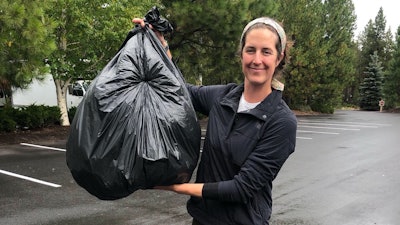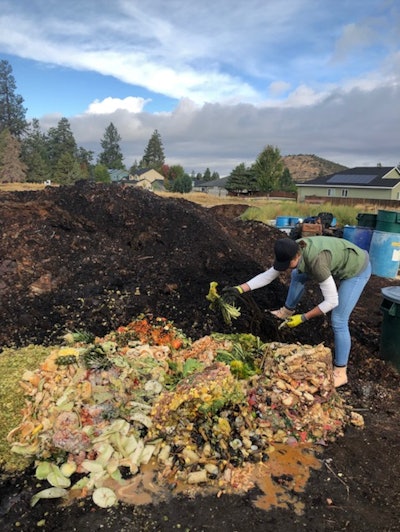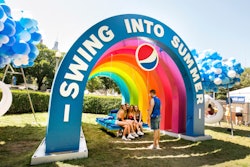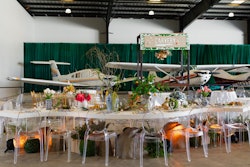
REI is a company that's become synonymous with the outdoors, so it's no surprise that its internal events strategy leans heavily into sustainable practices. The outdoor gear and apparel retailer, which operates as a co-op, runs company events for its peer recognition program, as well as a leadership conference—and open-air time is almost always part of the equation.
"I have never done that leadership conference in four square walls during my time at REI," says Lynn Hochrine, senior program manager of events and recognition at REI. "That leadership conference has been on the side of a ski slope. It has been on the banks of the Deschutes River in Oregon. It has been in a field in eastern Washington. The most typical venue it's been in was 18,000 square feet of a converted tennis pavilion, where we pulled in an Airstream trailer. We've done a lot of cool things."
A message REI wants to share with its employees through events is that the outdoors is for all. That means doing what's possible to mitigate anything harmful to the environment during the planning, production, and execution of these programs. To that effect, REI works with a waste consultant, Hannah Johnson of Perennial Zero Waste. "Food waste is one of the biggest culprits," Hochrine says.
Johnson has worked with REI since 2019 and is brought in during the early stages of planning. The venue is always key, and Johnson will ask things like: Who's the food service provider at the venue? Do they have the proper infrastructure for a three-stream waste collection (compost, recycle, waste)? What kind of swag or giveaways are planned? The goal is to map out the attendee experience from a sustainability and zero-waste perspective.
"REI definitely makes space for us to be there as the experts," Johnson says. "That's really nice because a lot of times, we're brought in at the very last moment, and it's like, 'Well, we could have eliminated or rethought the entire design of this from the start.' So those early conversations are super important, and then that tends to lead into procurement decisions too."
Johnson is also on site and will collect metrics like how much waste was diverted or how much was donated. REI once held an all-day event for 1,200 attendees and ended it with just one bag of trash.
"Attendee-facing waste from these events is slim to none," Johnson says. "It's absolutely incredible. A lot of it is through the choices of elimination, reduction, and reuse. Every sort of aspect of food service and planning can really drive down what gets thrown away."
Johnson has also worked with Sound Planning at REI events to make sure the last person going through a buffet is "scraping what's left," she explains. "Planners often hate that because it maybe looks like there wasn't enough, but if everybody's been fed and the last person going through is getting what's remaining, we've done our job."
 Johnson once drove food scraps from an event all the way to a local pig farm.Photo: Courtesy of Hannah Johnson
Johnson once drove food scraps from an event all the way to a local pig farm.Photo: Courtesy of Hannah Johnson
"That was an unusual call," she says. When leftover food can't be donated, Johnson will look to compost it at a commercial composting facility, many of which are in Washington state (where REI is based). But since there wasn't one near them in Oregon at the time, Johnson started calling local farmers.
The work is impactful in more ways than one. When Bend, Ore., did open up a commercial composting facility, Sunriver Resort put a composting program in place for events. No pig farms needed.
"That is something that I get really excited about," Hochrine says, "in terms of impact, legacy, and immeasurable giveback. That's certainly a by-product of our events and what makes them unique."
Tips for Other Event Profs
Here are some of Hochrine's and Johnson's quick sustainability tips:- "Before you try to make your whole event zero waste, pick a piece of that puzzle that's impactful and do it really well, and tell the story," Hochrine says. "All of our flights have carbon offsets. That's tracked within our corporate travel. We've seen other people doing that."
- "Purchasing is the ultimate starting point for what gets discarded at an event," Johnson says. "For example, signage: If you have an event that's happening year after year, don't date the signage or put anything on it that's going to time-stamp it. That's a way to extend its life cycle."
- "Don't be afraid to communicate your sustainability goals," Johnson says. "There's a misnomer with some event planners where they might not want to engage attendees around zero waste or sustainability. But I find, more often than not, that attendees who are involved in the conversation and have an awareness of the goals of the event want to participate."



















